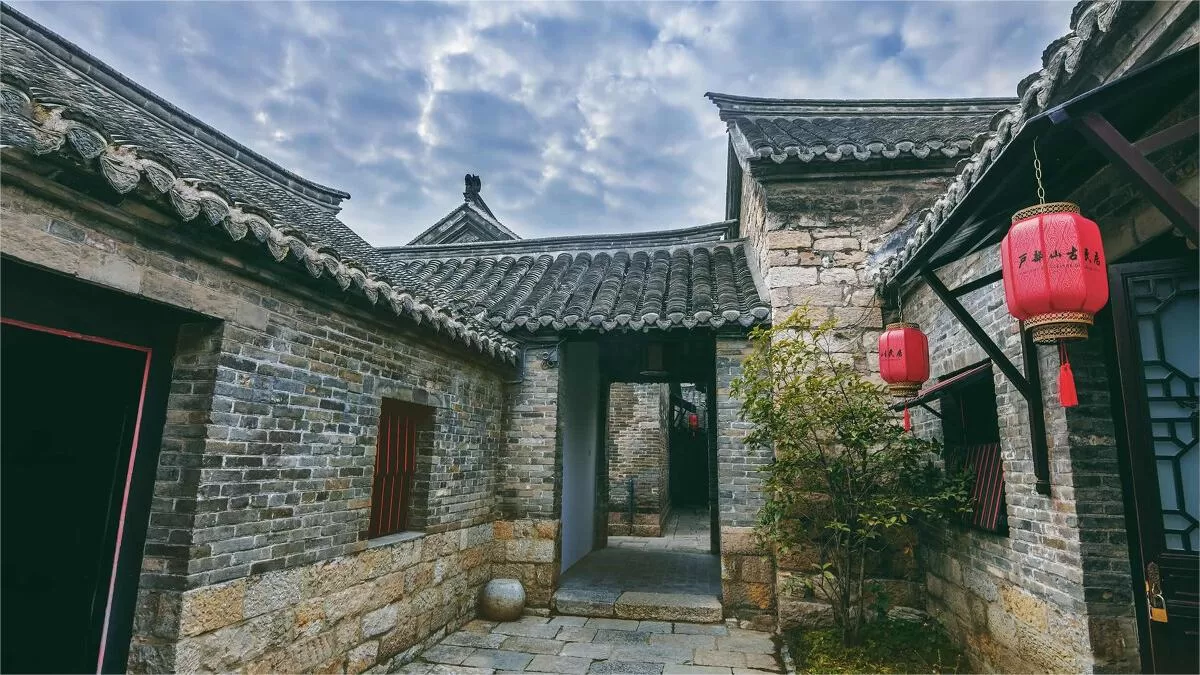Hubu Mountain (户部山), also known as Nanshan, is situated to the south of the ancient city of Xuzhou. Its historical significance dates back to 206 BCE when Xiang Yu, the Hegemon-King of Western Chu, established his capital in Pengcheng and constructed a horse training terrace atop the mountain. Throughout history, Xuzhou faced recurrent flooding from the Yellow River, prompting affluent individuals to invest substantial sums in constructing residences around Hubu Mountain to escape the water hazards.
From the late Ming Dynasty to modern times, the vicinity of Hubu Mountain became densely populated with high-walled residences and grand courtyards, presenting a tapestry of residential structures. Among them were the homes of officials and nobility, as well as residences of prosperous merchants and distinguished families. A colloquial saying from history encapsulates this trend: “Poor dwell north of the pass, the rich reside on Hubu Mountain.”
The ancient architectural complex on Hubu Mountain comprises 11 well-preserved traditional residences with over 500 rooms. These buildings, nestled against the natural contours of the mountain, exhibit a clever arrangement and a mix of architectural styles. The predominant form is the traditional courtyard, with a blend of the regularity seen in northern quadrangle courtyards and the elegance of southern residences. The walls predominantly feature blue stones and bricks, while the beams and frames are crafted from robust materials. Elaborate carvings, intricate paintings, and meticulous detailing showcase the architectural aesthetics of Xuzhou over several centuries during the Ming and Qing dynasties.
Table of Contents
- Basic Information
- Location and Transportation
- Highlights of Ancient Architecture Complex
- Vlog about Ancient Architectural Complex
- Other Attractions in Hubu Mountain
Basic Information
| Estimated Length of Tour | 1 – 2 hours |
| Ticket Price | 45 RMB |
| Opening Hours | 9.00 – 17.00; Last admission: 16.30 |
| Telephone Number | 0086-0516-83805809 0086-0516-83800265 |
Location and Transportation
The Hubu Mountain Ancient Architecture Complex is located at the intersection of Xiangwang Road and Zhuangyuan Street in Yundong District, Xuzhou City, Jiangsu Province, China. To get there, you can choose one of the following ways:
Bus: Take bus 19, 20, 39, 51, 62, 65, or 612, get off at Zhongguo Renshou Stop (中国人寿站), and walk about 150 meters to the west.
Metro: The closest metro station to Horse-Training Terrace is Hubushan (户部山). After getting out of the station from Exit 1, walk about 200 meters to the west to reach the attraction.
Highlights of Ancient Architecture Complex
Li Pan’s Top Scholar Mansion

Li Pan’s Top Scholar Mansion, located at 20 Laodong Lane, Yundong District, Xuzhou, is a prestigious residence associated with Li Pan, a top scholar. The original mansion comprised four courtyards, covering an area of 6,700 square meters and facing north. The grand entrance featured two flagpoles and two circular stone drums. The mansion included halls, pavilions, towers, side rooms, and a back garden, totaling over 300 rooms. The existing structure consists of three sections, including the main gate, a passage hall, inner screen wall, reception hall, and a tranquil residence. Covering an area of 4,560 square meters with a construction area of 1,230 square meters, the main building, Tranquil Residence, spans three rooms with a width of 10 meters and a depth of 6.2 meters, featuring a solid mountain-style roof.
Cui Family Grand Courtyard

Situated on the western slope of Hubu Mountain in Xuzhou, the Cui Family Grand Courtyard belonged to two distinguished scholars, Cui Hai and Cui Tao, during the Ming and Qing dynasties. The courtyard boasts two tall flagpoles in the front square, bearing the prominent character “Cui” and colloquially known as the “Cui Flagpoles.” It served as the congregating place for the Cui family in Xuzhou. The courtyard, covering 5,500 square meters with a length of 112 meters from east to west and a width of 44 meters from north to south, includes both upper and lower sections. The total construction area is 2,750 square meters, featuring 12 quadrangle courtyards and a total of 57 standalone buildings with 156 rooms.
Commercial Buildings

Around Hubu Mountain, vibrant commercial activities thrive, making it a significant hub for trade in the border region of Jiangsu, Shandong, Henan, and Anhui provinces. Noteworthy among the commercial structures is the Old Salt Shop, which served as the administrative center during the era of exclusive salt management. The front part of the building housed salt trading and storage, while the rear functioned as the administrative office. With hundreds of rooms, the Old Salt Shop played a pivotal role in the salt trade. Additionally, numerous commercial courtyards characterized by trade-facing storefronts and residential spaces for merchants contribute to the dynamic commercial landscape surrounding Hubu Mountain.





– The buildings in the Hubushan Ancient Architecture Group mainly consist of ancient buildings from the Ming and Qing dynasties, bearing witness to the rise and fall of wealthy families. The courtyard is so big that we even got lost inside, with ancient gingko trees adding a touch of history. It must be beautiful to take photos there in autumn. – Hubushan and Ximatai can be visited together. The red walls are for photography at Ximatai, while the quaint charm… Read more »